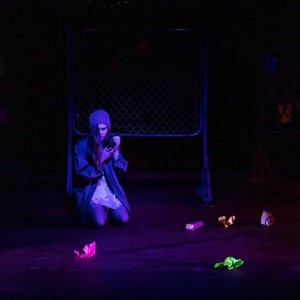
Polaroid Stories by playwright Naomi Iizuka is a clever attempt to link a modern story of street life with the timeless literature of the ancient world, employing a loose – extremely loose – adaptation of The Metamorphoses by Ovid, but somewhere between 8CE and 1997CE things really changed. The two writers share similar personal histories: both Ovid and Iizuka studied law before abandoning it for the creative arts; eventually Ovid was sent into exile the same year The Metamorphoses was published and Iizuka became a theater professor at the University of California at San Diego, which are plausibly comparable.
Lifting motifs from The Metamorphoses is nothing new, having been done by hundreds of authors including Shakespeare, Chaucer, Boccaccio and Dante. Much of the enduring popularity and influence of Ovid is his skill at telling stories where gods act like humans, and Iizuka does much the same by placing gods under a bridge living in a pile of trash, the self-described kingdom of “D” (Patrick Mark Saunders), an analogue of Dionysus, the god of wine and that which it inspires including drunkenness, ecstasy, madness – and theater. Here, D is a drug dealer, with “Skinhead Boy” (Andrew Iacovelli) and “Skinhead Girl” (Erika Rethorn) stealing his stash. Although Ovid presents about 250 separate stories in his 15 books that make up The Metamorphoses, Iizuka contents herself with three of the most well-known: “Eurydice” (Catia Ramos) and “Orpheus” (Brian Kozak), “Narcissus” (James Lucey) and “Echo” (Allison Crews), and “Philomel” (Julia Bartoletti). Weaving through and commenting on the action are “Persephone/Semele” (Lynsey Ford) and “G” (Victor Neto), the latter serving sometimes as an analogue of Zeus, king of the gods, and sometimes as an analogue of Hades, the god of death and the underworld; Zeus and Hades are brothers, and presumably D is the son of G and Persephone/Semele.
This review will deliberately avoid the powerful temptation of describing much of the original stories in Ovid, because what transpires on stage in Polaroid Stories is quite different in all but the barest outlines. Yes, Narcissus is preoccupied with a mirror and Orpheus seems stalkerish, but I walked into the play with an extensive knowledge of Ovid – I began reading him at age 12 – and I don’t think an audience member would be disadvantaged having never heard of Ovid beyond reading the director’s note in the program (Burbage almost always has really good director’s notes). The form of Polaroid Stories is so influenced by ancient literature that one could reasonably metatheatrically interpret the first act as katabasis and the last act as anabasis, although it would be equally valid to regard the last act as yet more katabasis.
At Burbage, Polaroid Stories is in large part a movement piece, with Orlando Hernandez credited as “movement designer,” making extensive use of a set, credited to Iacovelli, that prominently includes sections of chain-link fence and diaphanous fabric that all get moved around by the actors to put up and take down barriers between them. Director Kate Kataja must have told her cast, above all, just to keep moving, and they do.
The cast is uniformly excellent. Ford is outstanding, bringing a lithe, dance-like quality to the role of Persephone/Semele, so entrancing through both expression and graceful movement it is difficult to take one’s eyes off of her. Ramos and Kozak dance as a pair, with her sharp dialogue as she asserts her independence while he tries to reel her in – sometimes blocked by a human wall formed by the others. Lucey is hilariously over-the-top with a somewhat ridiculous character, only slightly reined in by Crews. The real conflict comes, unsurprisingly, between Saunders, Neto, Iacovelli, and Rethorn, each baiting and taunting the others, and Saunders shines in his duels with Neto and Iacovelli.
Bartoletti is mesmerizing in a role that calls upon her to sing beautifully but never speak as she becomes a haunting presence (In Ovid, Philomel has her tongue cut out and is turned into a nightingale by the gods who take pity, although Ovid shared the universal but mistaken belief in the ancient world that female nightingales sing although in real life it is the male. Ironically, I once reviewed Bartoletti in a performance of Shakespeare’s Titus Andronicus where the character of Lavinia is drawn from this story.) Mercifully, the story of Philomel is highly abstracted, with her deceiving attacker, Tereus, not directly portrayed.
Approaching this play expecting a linear narrative is a recipe for disappointment: Kate Kataja’s director’s note calls it “purposefully vague” but also notes, “Human nature is cyclical… we still go to war; we still fight for power… we still make terrible things happen because of insecurity and jealousy and fear.” Polaroid Stories and its allusion to ancient themes forces one to see the universality of ordinary experience. This is not a play specifically about drug addicts or street kids or any other arbitrary selection of humanity, but about all of it. If you’re open to the non-linearity of the play, Burbage brings out the potential in a difficult script.
Polaroid Stories (a RI premiere), by Naomi Iizuka, directed by Kate Kataja, Burbage Theatre Company, 249 Roosevelt Ave, Pawtucket. Two acts, about 2h including 15m intermission. Through May 19. Refreshments available. Web: burbagetheatre.org/polaroidstories E-mail: info@burbagetheatre.org Tel: 401-484-0355 Tickets: app.arts-people.com/index.php?actions=4&p=1 Facebook: facebook.com/events/171502550422060

